Stone Living Lab Announces Partnership with 2021 Earthshot Prize Finalist Living Seawalls
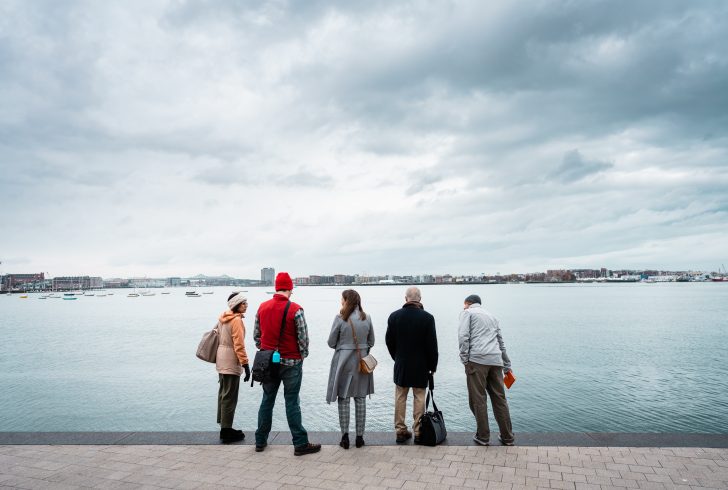

The Stone Living Lab and Living Seawalls announced today they will partner on an ecological restoration project on Boston Harbor’s existing coastal seawalls to support the region’s climate resiliency efforts. The partnership was announced on Thursday, December 1 as Their Royal Highnesses The Prince and Princess of Wales visited Piers Park while in Boston to celebrate The Earthshot Prize 2022.
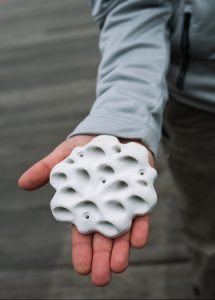
The Stone Living Lab is developing monitoring systems, research projects, and prototypes to test nature-based approaches for building coastal resilience in urban areas like Boston Harbor. Over the course of 2023, two project sites in Boston Harbor will be selected for the installations, following a review from the Lab researchers and outreach to the local community.
In each site, the partners will install Living Seawalls panels, mimicking the habitat features of natural shoreline ecosystems, such as rock pools and crevices, to be fitted in scalable mosaics onto seawalls with otherwise low marine biodiversity. The complex panel surfaces will increase the habitat area available for growth of marine life, such as shellfish, tunicates, and seaweed, critical to supporting the rest of the food web. They will also add protection to marine life from high temperatures and predators.
In 2021, Living Seawalls was named a finalist for The Earthshot Prize to Revive our Oceans. Launched in 2020 by Prince William, The Earthshot Prize is a global prize for the environment, designed to discover, spotlight and scale groundbreaking solutions to the world’s greatest challenges.
Inspired by President John F. Kennedy’s ‘Moonshot’ program, The Earthshot Prize was created to mobilize a wave of innovation and inspire a collective mindset of optimism, possibility, and creativity in the global race to repair and regenerate our planet.
Since becoming an Earthshot Prize Finalist, the Living Seawalls team have enjoyed a significantly increased global profile, including an audience with Australian PM Scott Morrison and being featured on Cate Blanchett’s Climate of Change podcast. They have also continued to win commissions around the world including two recent UK projects, as well as expansion of the Sydney Harbour project supported by a recent AUD $4.5 million grant from the New South Wales Government.
With support from Herbert Smith Freehills – a Member of The Earthshot Prize Global Alliance, they are on track to spin out from the Sydney Institute of Marine Science to be an independent organization by end of 2022, allowing them to scale up to meet the increased global demand.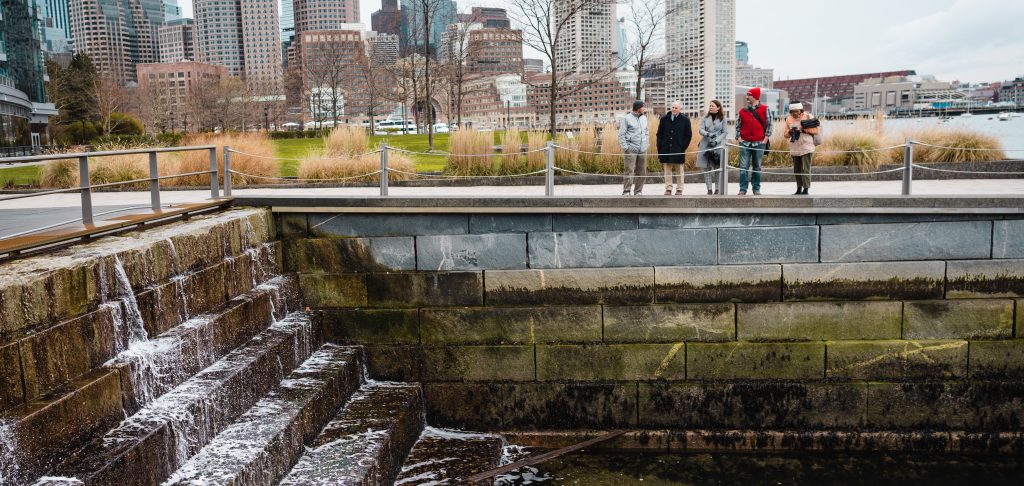
“Boston Harbor’s coastal communities are presently threatened by coastal flooding, as shown by University of Massachusetts Boston research, and over the next few decades this threat is amplified due to climate change,” said Paul Kirshen, Professor at UMass Boston School for the Environment, and Research Director of the Stone Living Lab. “We are honored to conduct collaborative research with our colleagues from Living Seawalls on the applicability of their prototype to help improve biodiversity and manage flooding in Boston Harbor.”
“The climate resilience issues facing the Boston waterfront require collaboration from organizations near and far,” said Kathy Abbott, President and CEO of Boston Harbor Now, Executive Committee member of the Stone Living Lab, and Earthshot Prize Host Committee Member. “As one of the Lab’s key partners, we are so excited to work with the creative and dedicated team from Living Seawalls on this project.”
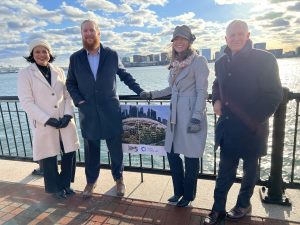
“In addition to research, the Stone Living Lab also carries out educational and engagement activities that promote social resilience and equity,” said Joe Christo, Managing Director of the Stone Living Lab, and Earthshot Prize Host Committee Member. “The Living Seawalls project will be an incredible opportunity to engage residents and students and can result in many ecological and societal benefits.”
“Construction is a growing source of biodiversity loss in our seas and is projected to increase by 70% over the next 10 years in response to climate change and population growth. Living Seawalls is a modular and adaptable solution bringing life back to built structures around the world,” said Dr. Katherine Dafforn, Associate Professor at Macquarie University, and co-founder of the Living Seawalls project. “We are thrilled and honored to partner with the Stone Living Lab to bring Living Seawalls to Boston. This project will showcase the amazing benefits to be gained by designing built structures for both humans and nature and serve as an enduring legacy of The Earthshot Prize Boston 2022.”
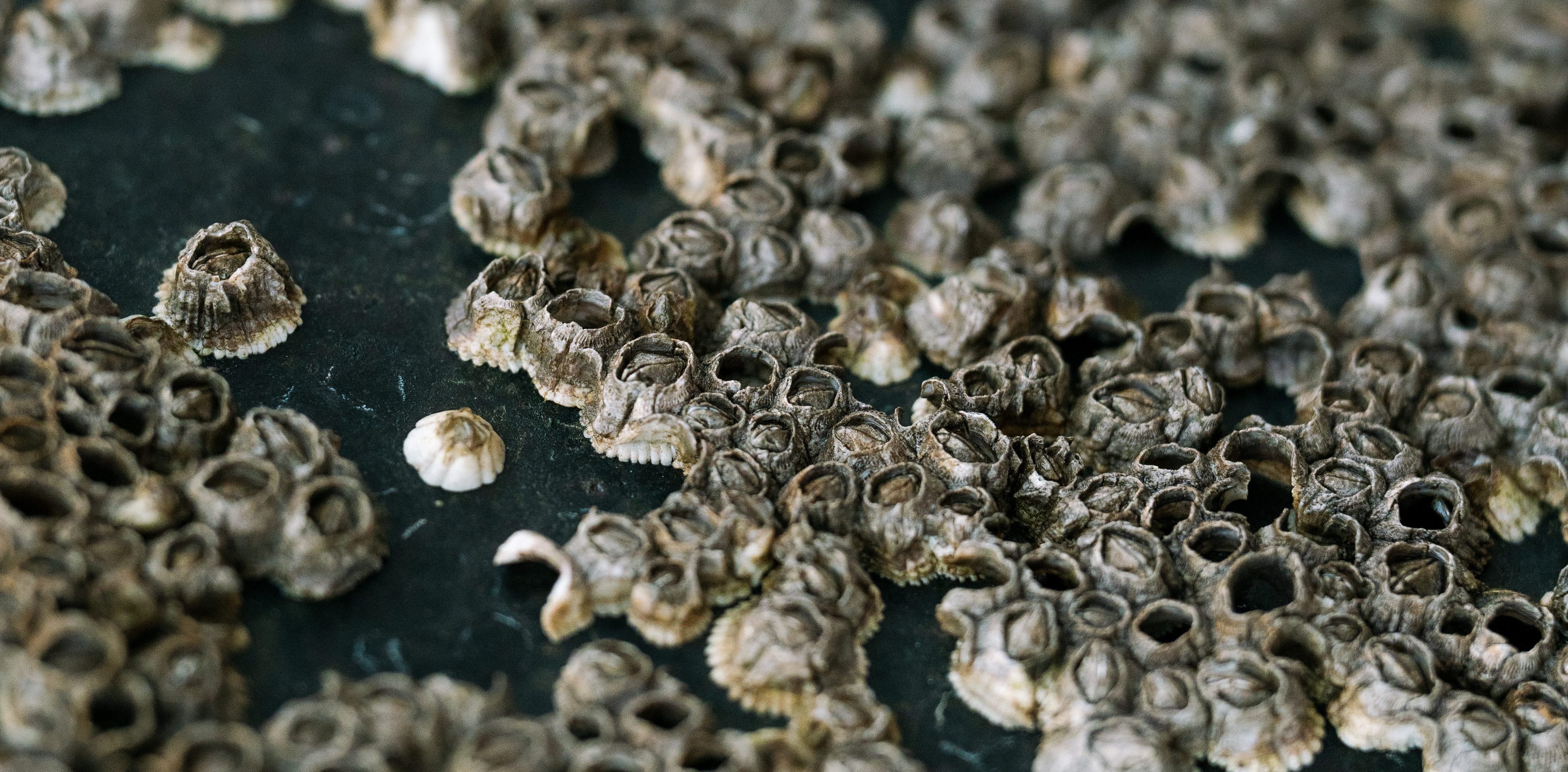
Living Seawalls – a project founded in Sydney Harbour – has a nature-based solution to the construction boom in our seas. Building on more than 20 years of research and using state-of-the-art 3D printing technology, we have developed modular habitat panels fitted to built structures that mimic natural features such as rock pools, crevices and ledges and sponge gardens, helping marine life thrive. The complex surfaces of the panels increase the habitat area for growth of seaweeds, shellfish and other marine life and provide shelter from predators. Living Seawalls habitats are up to 10° C cooler than the unprotected surface of built structures, providing protection to marine life as the climate warms.
To date we have developed 10 different types of seawall panel and 4 different types of piling module. Our research program has shown that after only 2 years, marine life has increased by 36%. Our panels are home to more than 100 species of fish, invertebrates, and seaweed. What started as a single Living Seawall in Sydney Harbour has expanded to 26 Living Seawalls created with more than 1000 panels in Australia and internationally. In the next 5 years we aim to have Living Seawalls in every continent and support the connection of people with the oceans, particularly around urbanised areas – where most
people live, work and play.
The UMass Boston School for the Environment offers a unique opportunity for aspiring environmental
researchers and leaders to ensure a prosperous and just future for our planet. We bring together smart,
committed, and ambitious people from across the world whose interests vary from urban planning to
sustainability to marine science to environmental management and everything in between. For our school,
it’s not about a job. We’re driven by purpose – looking beyond ourselves to pursue careers that make
positive, sustainable contributions to our planet and people.
Boston Harbor Now (BHN) champions Boston Harbor for everyone. The harbor is critical to the health and well-being of our residents and economy. Together, we can lead the nation in building a 21st Century waterfront – a waterfront that provides unprecedented opportunities for public use and is well-adapted to climate change. Boston Harbor Now is the only nonprofit organization that focuses on Boston Harbor as a whole, working for change that benefits everyone. The organization promotes collaboration between the public and private sectors, drawing on years of success with the Harbor Cleanup, and creation of the Boston Harbor Islands National and State Park (2,000 acres) and the Harborwalk (43 miles). BHN is uniquely positioned to leverage investments by the private sector and public agencies, including the City of Boston, the Massachusetts Department of Conservation and Recreation, and the National Park Service.
About The Earthshot Prize
Founded by Prince William and The Royal Foundation in 2020, The Earthshot Prize is a global environmental prize to discover, accelerate and scale ground-breaking eco-solutions to repair and regenerate the planet. Inspired by President John F. Kennedy’s Moonshot, which united millions of people around the goal of reaching the moon, The Earthshot Prize aims to catalyze an Earthshot challenge to urgently encourage and scale innovative solutions that can help put the world firmly on a trajectory towards a stable climate, where communities, oceans and biodiversity thrive in harmony by 2030. The five challenges are: Protect and Restore Nature; Clean our Air; Revive our Oceans; Build a Waste-free World; and Fix our Climate.
The Prize aims to turn the current pessimism surrounding environmental issues into optimism but championing inspiring leadership and helping to scale incredible cutting-edge solutions. It will discover 50 winners over 10 years with the power to repair the planet. More than a prize, The Earthshot Prize works in partnership with a Global Alliance of Partners to support the scaling of the solutions discovered and selected each year.